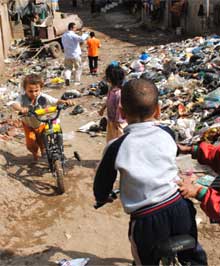 The impact of urbanization on population health, health equity and the environment are key concerns for national and municipal authorities21 October 2012 – Urban health challenges across the WHO Eastern Mediterranean Region are acute and increasingly complex. Unplanned urban growth puts millions of people living in urban slums and disadvantaged areas in a particularly vulnerable situation, often with poor health coverage and limited access to social services. These urban populations – over one third of the world’s urban population – are also more vulnerable to disasters and at higher risk of communicable and noncommunicable diseases, injury and early death than rural populations.
The impact of urbanization on population health, health equity and the environment are key concerns for national and municipal authorities21 October 2012 – Urban health challenges across the WHO Eastern Mediterranean Region are acute and increasingly complex. Unplanned urban growth puts millions of people living in urban slums and disadvantaged areas in a particularly vulnerable situation, often with poor health coverage and limited access to social services. These urban populations – over one third of the world’s urban population – are also more vulnerable to disasters and at higher risk of communicable and noncommunicable diseases, injury and early death than rural populations.
The essential value of health equity and social justice is reaffirmed in the Rio Political Declaration on Social Determinants of Health, adopted by the World Health Assembly in May 2012. Governments have a responsibility for the health of their peoples which can only be fulfilled by the provision of adequate health and social measures; health equity and social justice in the provision of basic services have now become guiding principles for sustainable development initiatives.
In response to the challenge, the WHO Regional Office has established a Regional Healthy City Network web site to support city planners in their efforts to strengthen intersectoral collaboration, assess health and social inequity and encourage increased access for city dwellers to quality health, environmental, social and cultural services. City planners and authorities are urged to join the Network and register their cities through the website.
It is hoped that as many as 200 cities will be registered in the Network by the end of 2013.
Related links
Rio Political Declaration on Social Determinants of Health


